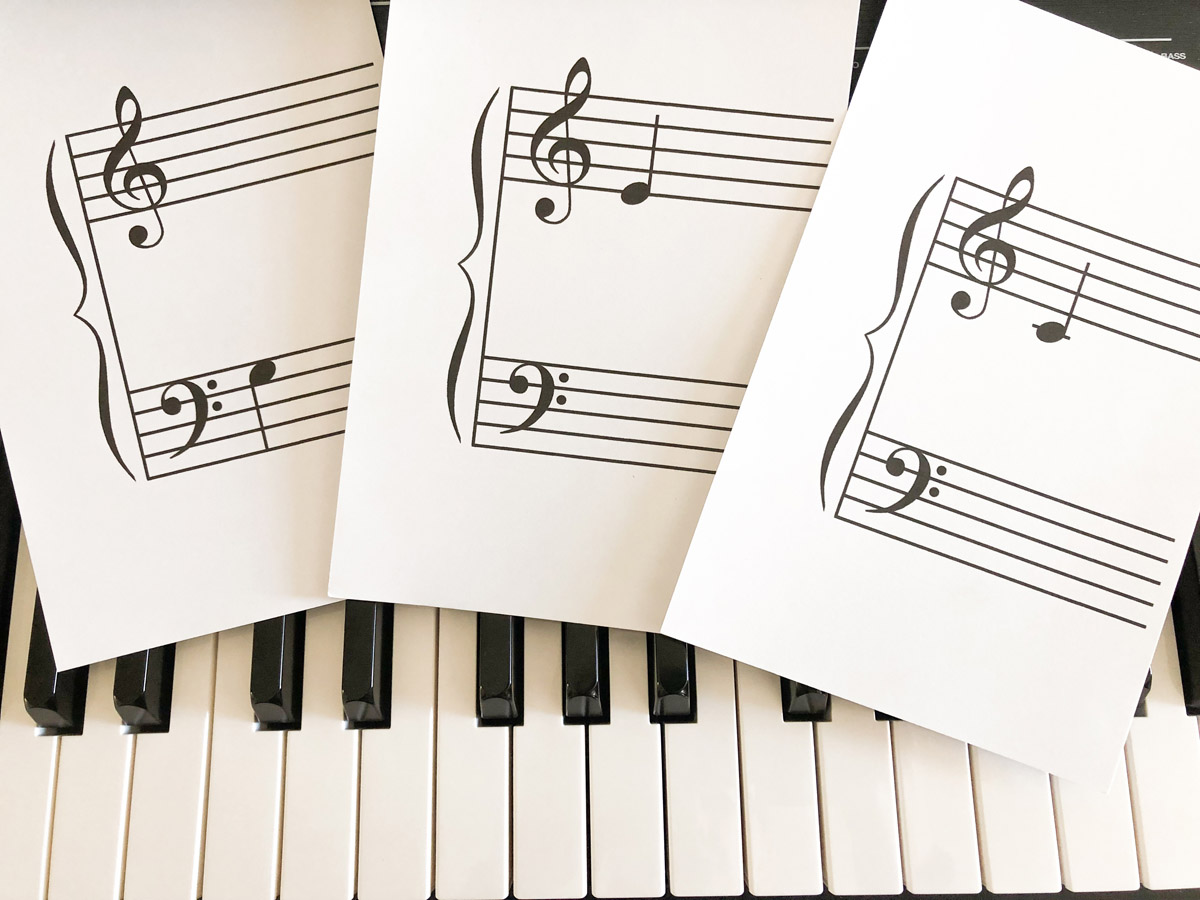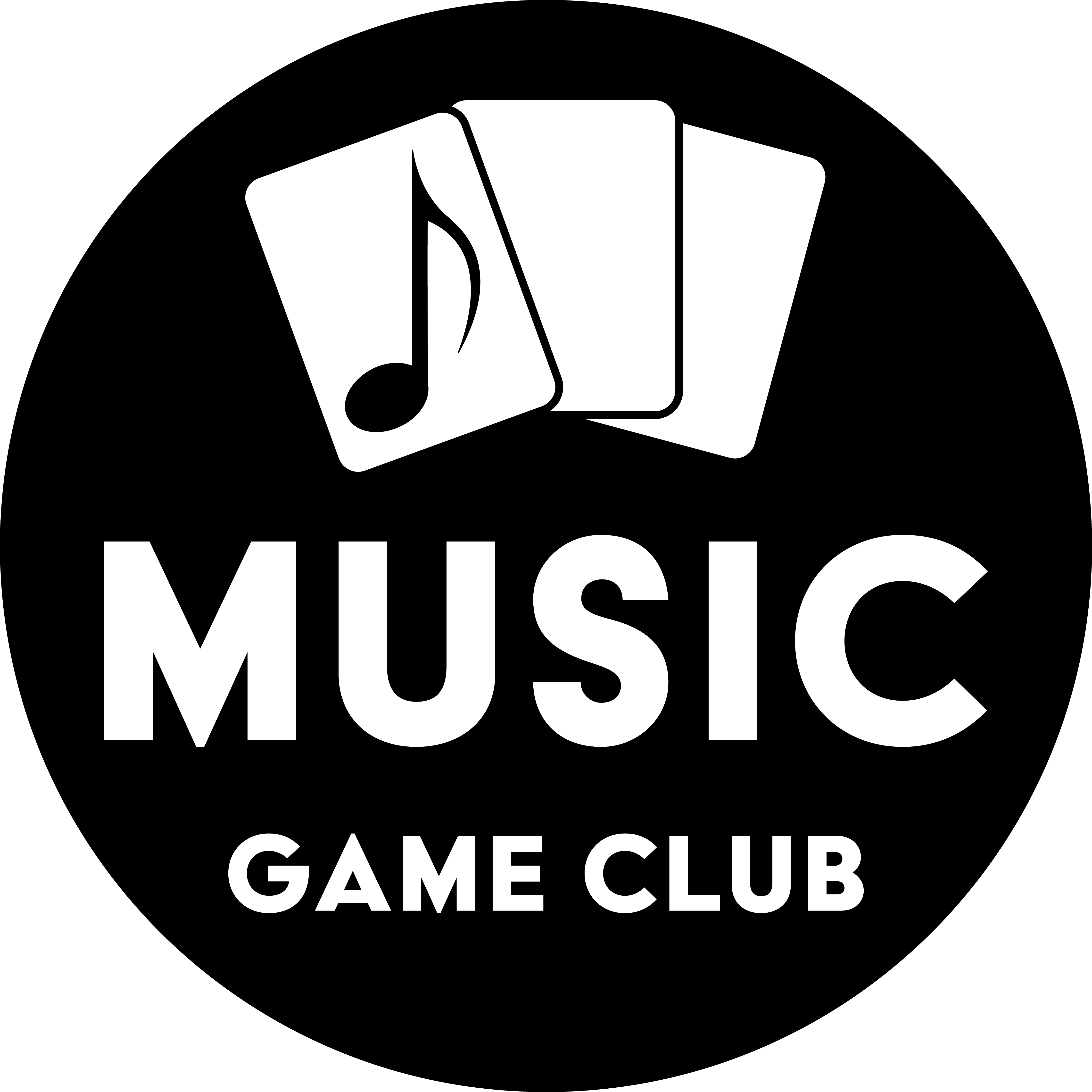
The excitement of a new year of piano lessons sometimes fades quickly and as a teacher, I usually find myself needing some low-prep music games & activities to keep students engaged in piano lessons.
I don’t know about you, but the first piano lessons after summer break are an interesting dynamic.
Students are excited to be back to piano lessons…
or they’re overwhelmed with readjusting to school, music lessons, and other extracurricular activities…
or they’ve seemingly forgotten almost everything they knew before summer break and are frustrated with “going backward.”
Which category does your students fall into? Probably all three, like ours.
The first piano student–those who are excited about lessons–are the easy ones.
It’s the overwhelmed and frustrated students that present problems.
I like to solve these problems by making piano lessons fun with low-prep music games & activities.

Why Music Games & Activities?
Play-based learning isn’t how I learned piano. I dug in, did the work, and, even if I hated it, I practiced.
However, many researchers are discovering that play-based learning is beneficial to child development. Additionally, many piano teachers are discovering that adding music games & activities to piano lessons helps their students be more engaged and cheerful in lessons.
Today, I will share with you five solid ideas for low-prep music games and activities you can apply to almost any piano lesson.
All you need to have on hand is at least one of the following:
- Pencil & paper
- Whiteboard & marker
- Flashcards
- Staff paper
And, for some of these activities, you don’t need anything!
Let’s get you some fun, low-prep music games to use in your piano studio!
Low-Prep Music Theory Review Games
It’s common for piano students to forget theory concepts over summer vacation–especially if some of those concepts were freshly taught in April or May.
Sometimes I’ve accidentally made a student initiate self-criticism because of what they’ve forgotten. Our goal as teachers should be to never make a student feel bad about music theory concepts they’ve forgotten.
There are many ways you can help remind your piano students of theory concepts with low-prep music games where they feel excited and productive rather than shamed and confused.
If you come across some vital music theory concepts students are rusty on, create a game.
The winning rule is that you walk them through the review and then “play the game” with them so it boosts their confidence as they relearn concepts.
1) Make a Match Music Game

Materials needed:
- Whiteboard & marker
OR
- Pencil/pen & paper
Step 1
Determine the symbols or terms your student needs to review (maybe it’s dynamics, tempo markings, note values, rests).
Step 2
On one side of the paper or whiteboard, draw the music symbols or terms your student needs to review. Do this during lesson while they are watching you and discuss what you’re drawing as you draw (e.g. “This is the half note… do you remember if it gets two beats or twenty? Now the quarter note. It gets… yes, one count!”).
Step 3
Mix up the definitions/answers on the other side of the paper/board.
Step 4
Have your student draw connecting lines between the two.

This low-prep music game is great for two reasons.
First, you are reviewing the answers with your students instead of asking them to rely on their memory.
Second, when it’s their turn to play, the answers are right there.
This gives the student confidence in reviewing music terms and prevents them from feeling shame, embarrassment, or frustration.
2) Fill in the Blank Music Rhythm Game

Review rhythms and music math for any level music student with this game. You can help beginning students with basic rhythm patterns or more advanced students with complex rhythms.
Materials needed
- Whiteboard & marker
OR
- Pen/pencil & paper
OR
- Staff paper
Step 1:
Draw a time signature.
Step 2:
Draw a measure with either note or rest patterns and leave the last note out (e.g. “4/4: quarter note, half note, ________”).
Step 3:
Student has to “fill in the blank” with the correct answer.

Each time the student is correct, chalk one up on the game board. When the student reaches five accurate answers, they win.
Take the game further by having the student clap & count after they have filled in the blank.
Turn the game around and have your student create a rhythm puzzle for you to solve (though, I recommend only doing this if you’re fairly confident your student won’t be embarrassed if they get the measure wrong).
3) Music Flashcard Note Review Games
Most students forget at least a few note names over the summer. Get a deck of note flash cards and make it into a game.
Materials needed
- Music note flashcards
Music Flashcard Game 1: Review

Start with just 2-3 flashcards and name the notes with your student. Shuffle the cards, lay them out, and ask the student to point to a specific note (e.g. “C” or “E”). Gradually add one or two new notes to the stack as you go.
Music Flashcard Game 2: Match

Play a match game where you have the treble clef notes and the student has the bass clef notes. You lay down one of your cards and the student has to find the same letter name in their clef (“I have treble clef F. Where is your bass clef F?”).
Change this game up by switching who has which clef. And if your student is feeling confident, you can let them call out the note to match.
Music Flashcard Game 3: Compose

This is my personal favorite music flashcard game. Guide your student to compose a short melody with flashcards.
Give them 5-10 flashcards of notes they need to review. Have the student line up the notes on the piano music stand and then play as they name the notes.
Do they like the melody? If not, see what happens when they switch up a few notes. This is a great, interactive music flashcard activity that combines review with practice.
4) Low-Prep Music Studio Challenges
Try out some studio-wide music challenges for your students. What is one theory concept all your students need a refresher on?
The Circle of Fifths? Note values? Note names? Tempo markings?
At the beginning of each lesson, spend 5 minutes reviewing the concepts. For your younger students, have them repeat after you (bonus if they can beat you to saying something because they learned it!).
To build studio connection, create a chart where you put a sticker on each students’ name when they’ve done the review.
Note: it doesn’t mean they’ve mastered it; keep the stakes low–they’re just reviewing here, so the act of going through it, even if they’re repeating it after you, counts.
Alternatively, you can decide on other studio-wide challenges. Here are some ideas:
- Practice challenge (aim for 4 practice days each week and see who can keep up)
- Sight-reading challenge (push your students to sight-read 100 pieces in a year)
- Music memory challenge (challenge your students to memorize a certain number of pieces in a semester–make it attainable)
- Mastery challenge (have each student set a goal for how many pieces they want to learn in a semester and see who can reach their goal)
5) Use Ear-Training Music Games
There are a lot of ear-training games you can do that require no special materials and maybe just a little mental prep. Strengthen your students’ ear-training by having their back turned to the piano while you play a quiz.

Here are some ear-training concepts you can use:
- High versus low notes
- Major versus minor chords
- Intervals
- Harmonic or melodic
- Major, minor, diminished, augmented
- “Guess that tune”
- Throw in some fun pop tunes or movie themes to get students really engaged!
- Play pieces from their lesson book that they learned months ago
Even more low-prep music activity ideas:
Maybe a game isn’t what your student needs. You can make piano review fun even without games.
Here are some ideas to get you started:
- Pick a piece the student loved last semester. If they are struggling to remember it, re-teach parts of it by rote.
- Find a random piece of music that your student has never played before but is slightly under their level
- Find a YouTube video play-along
- Compose a song together (this will review rhythm and note reading)
- Play a duet with your student (it can even be a solo piece where they play one hand and you play the other)
Don’t stop there!
There are hundreds of ways you can reinvigorate piano lessons with games & activities. These don’t even scratch the surface, but are just a few ideas to get your wheels turning.
What are your best low-prep games or activities to use in piano lessons? Comment & share! I’d love to hear your students’ favorites!
If you try one of these ideas in your piano studio, let us know by tagging us on social media @musicgameclub (Instagram & Facebook).
And if you want to up your music lesson experience even more, join Music Game Club membership, where we will email you a printable game each month to keep your students happy and engaged.

>>> Sign up for Music Game Club membership here
Don’t miss out!
Follow us on Instagram, Facebook, and Pinterest. Or… get ALL the teaching inspiration and game ideas we share: sign up for our newsletter and don’t miss a thing!




Thank you for sharing your ideas. I will be adding some of these into my lesson plans! 🙂
You’re very welcome! I hope your students have a blast!